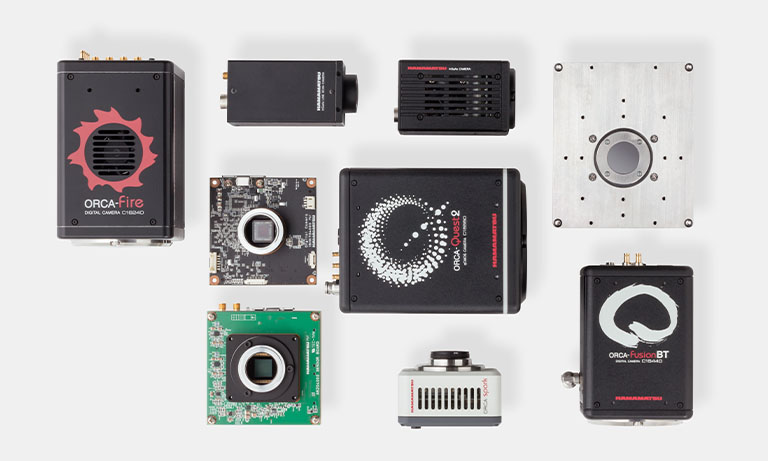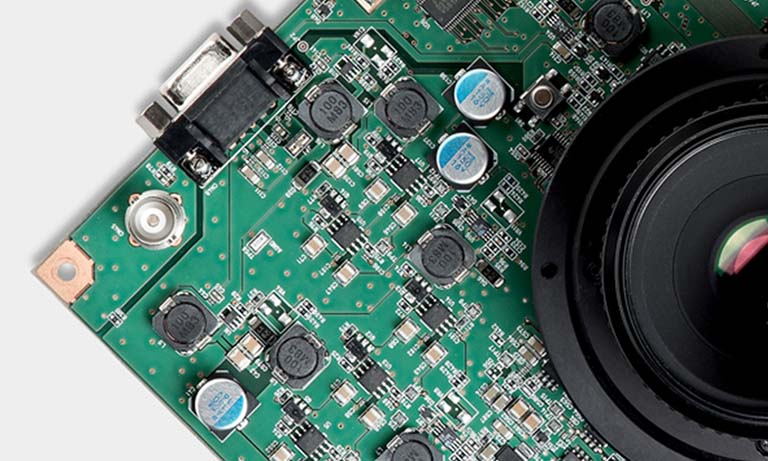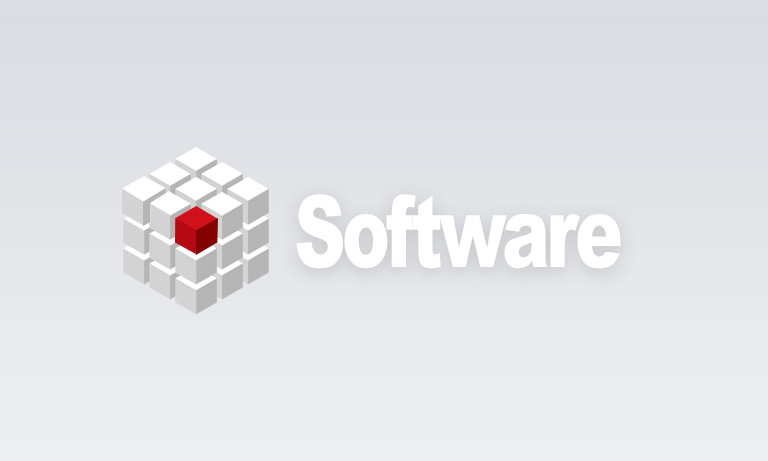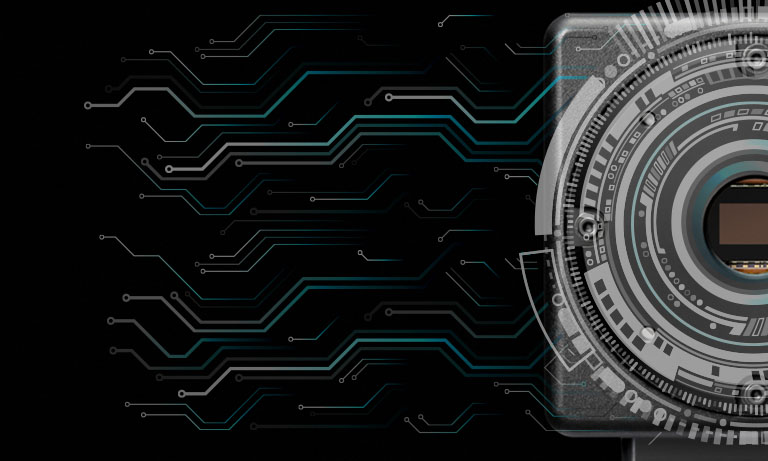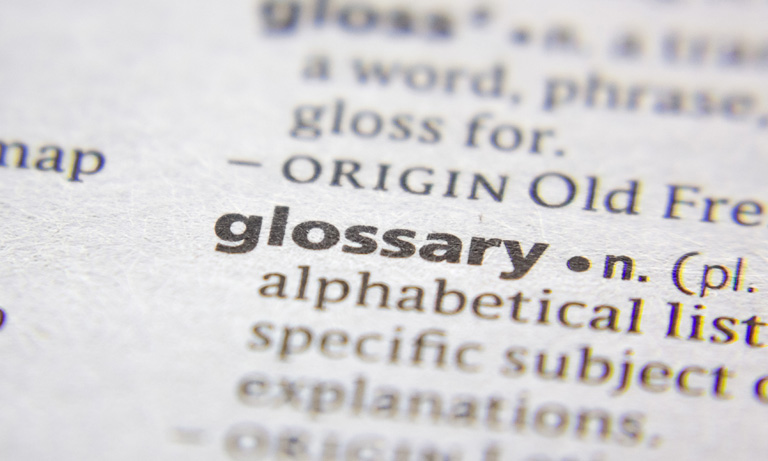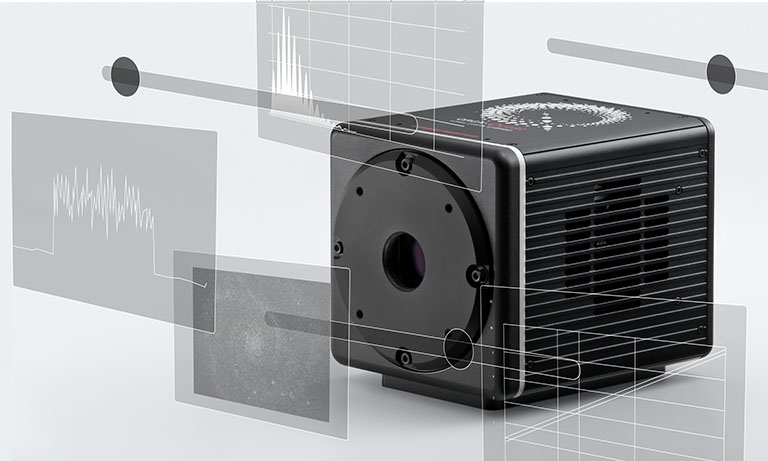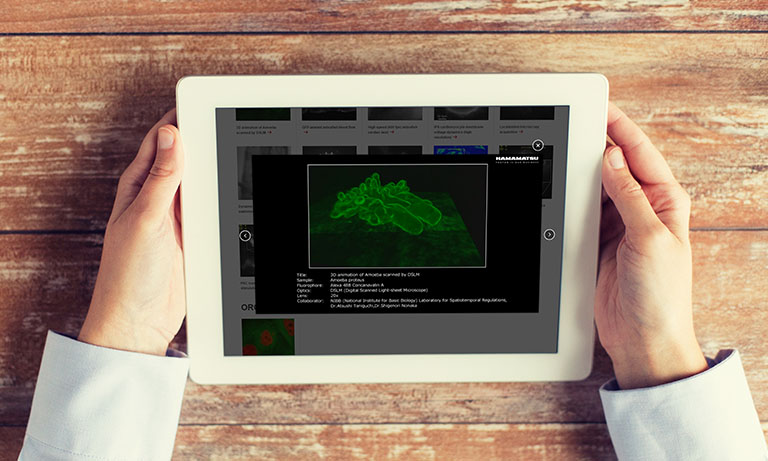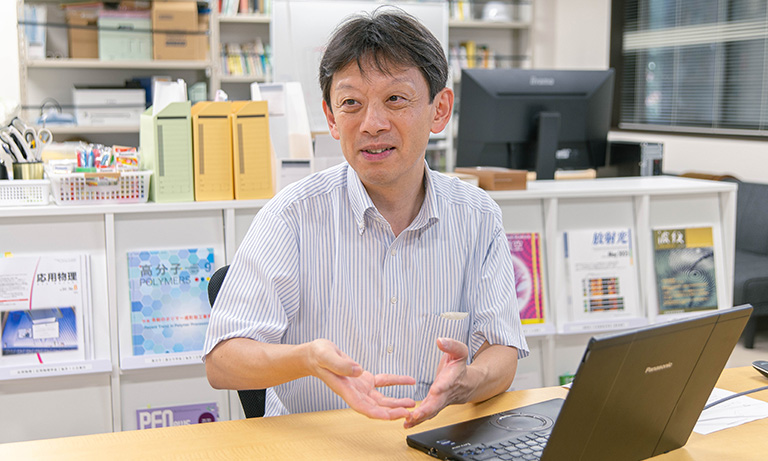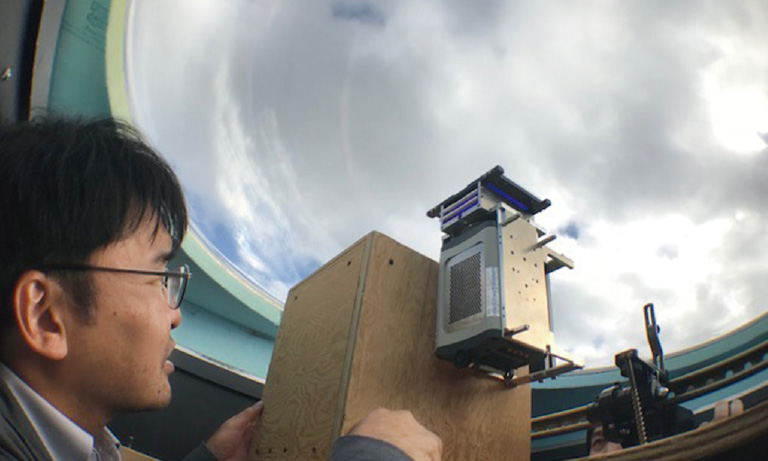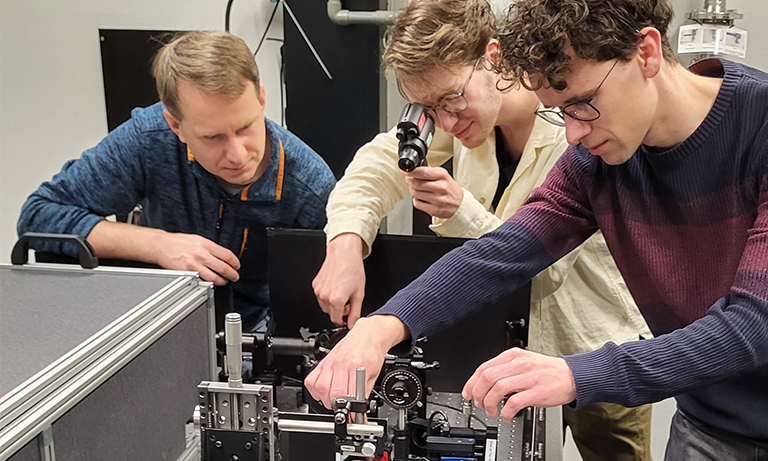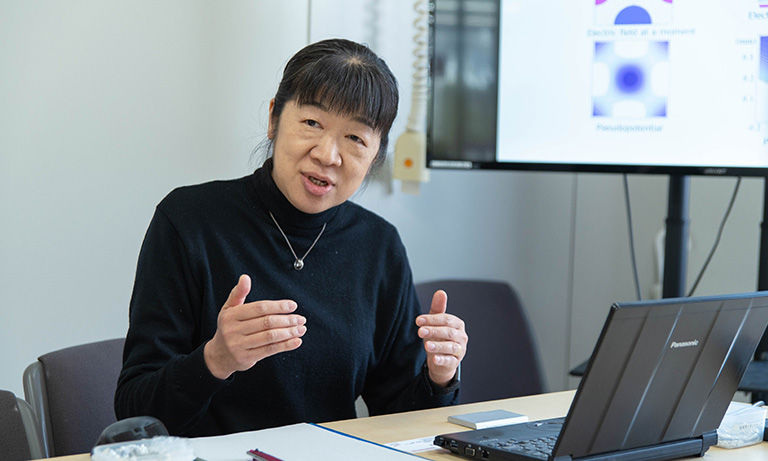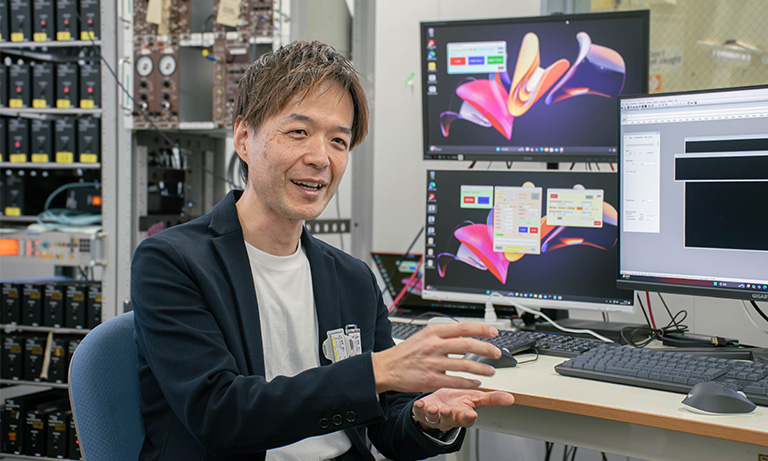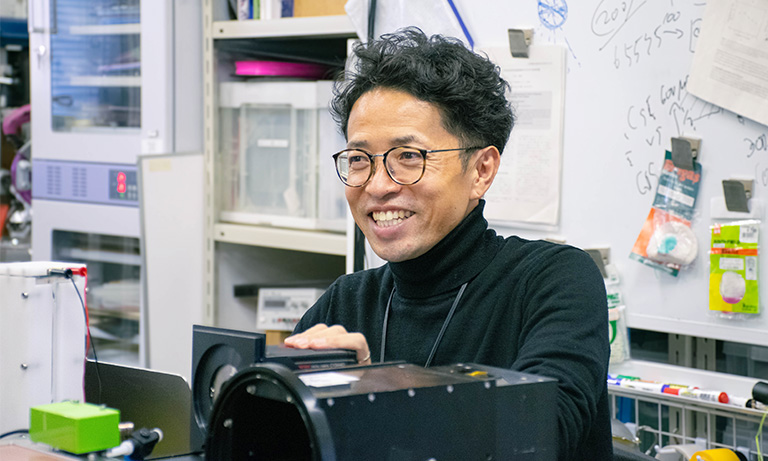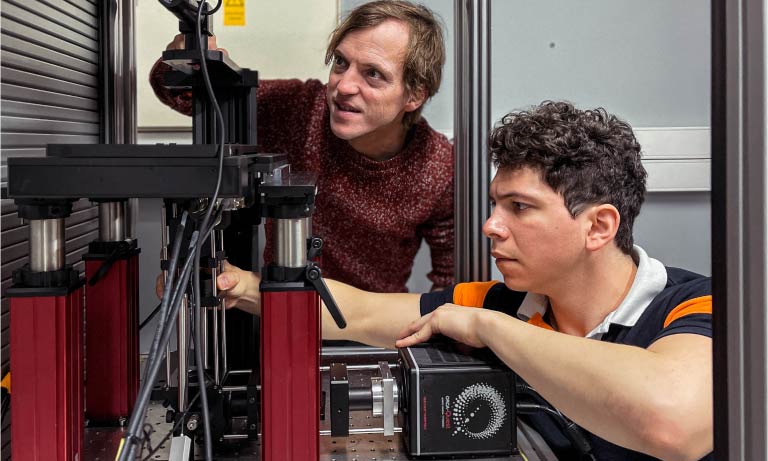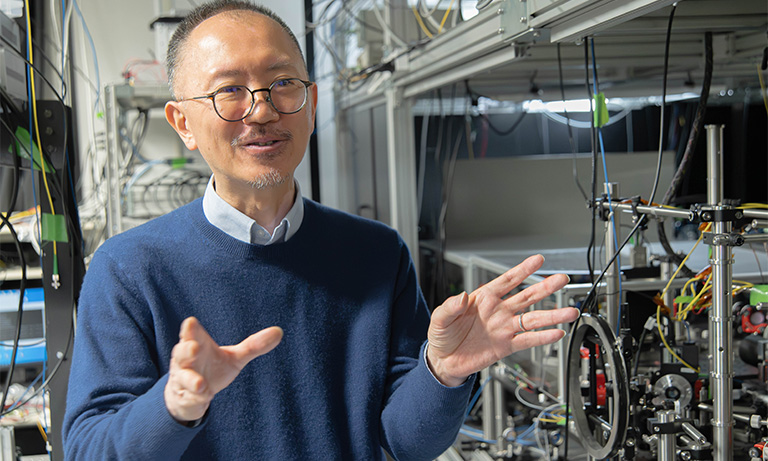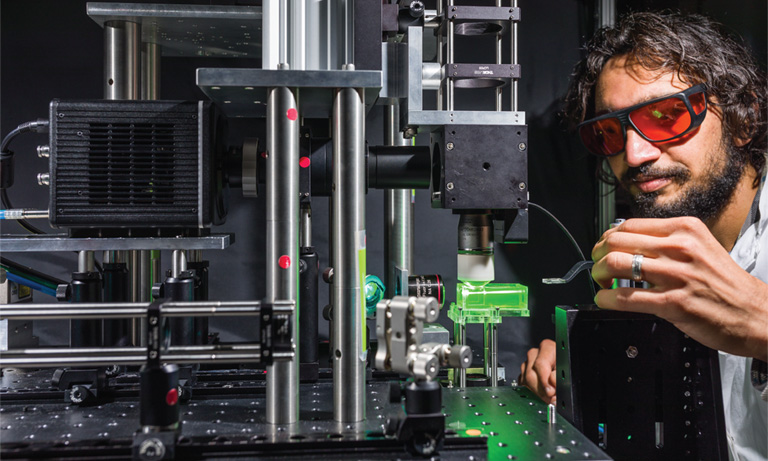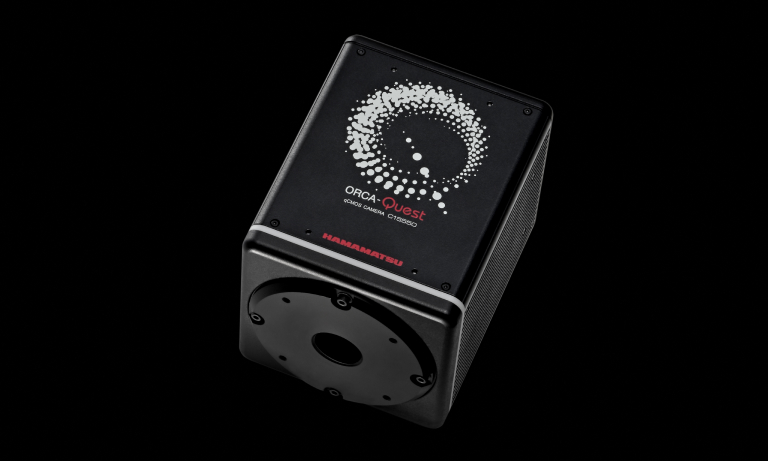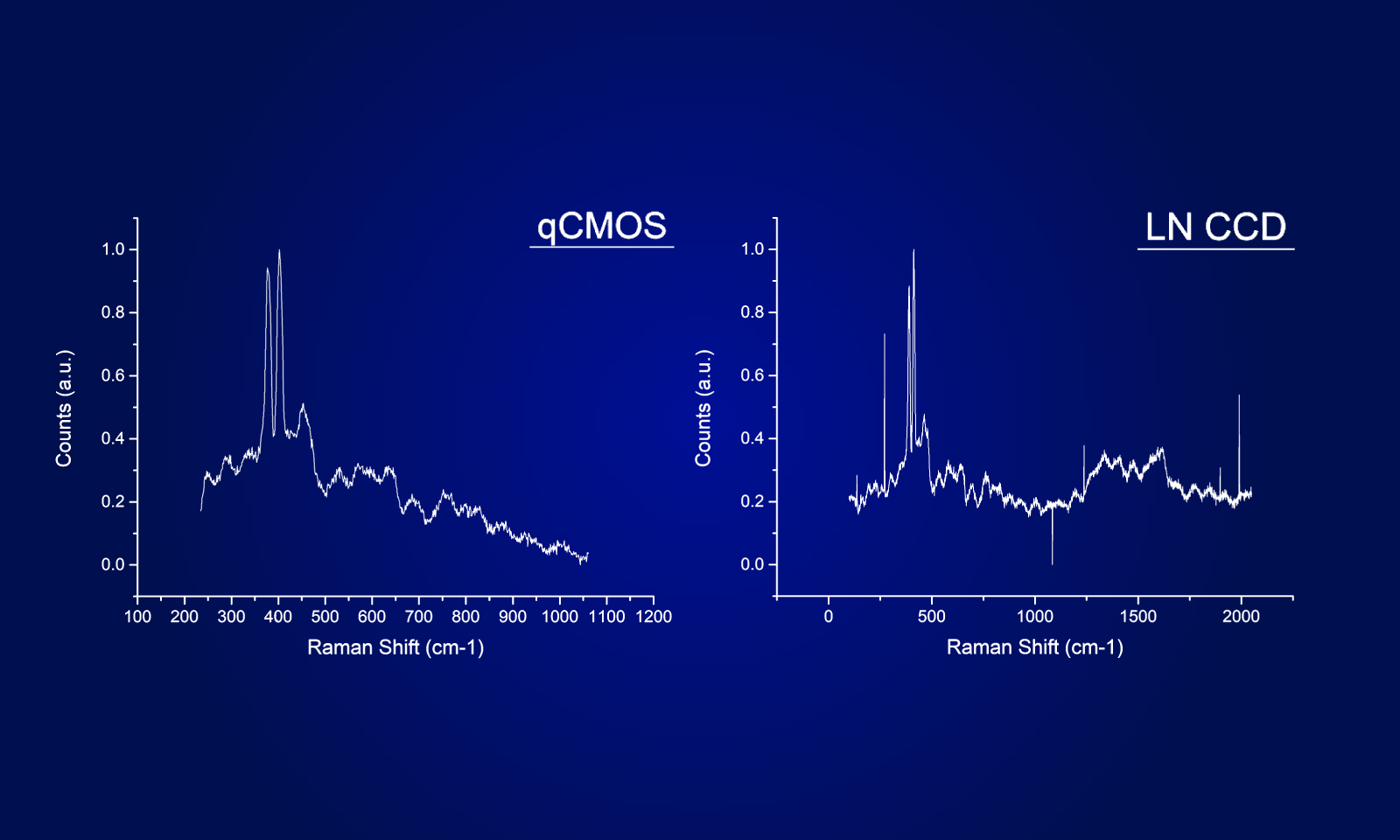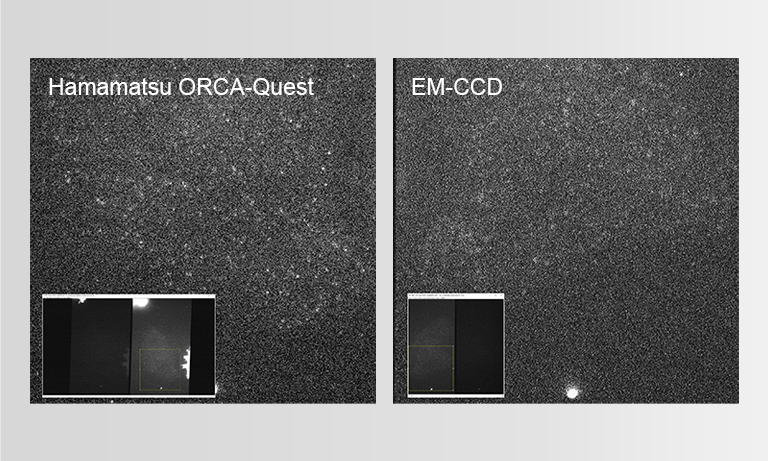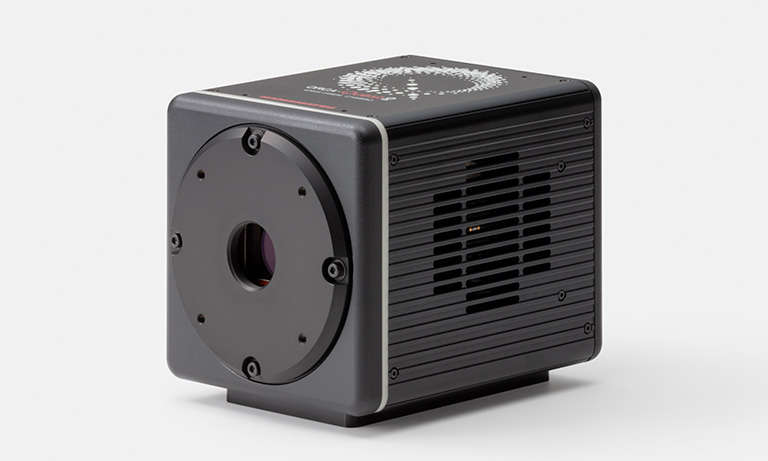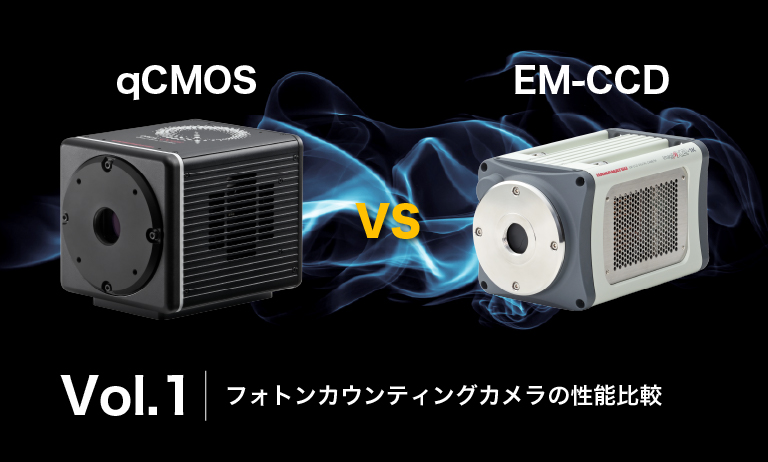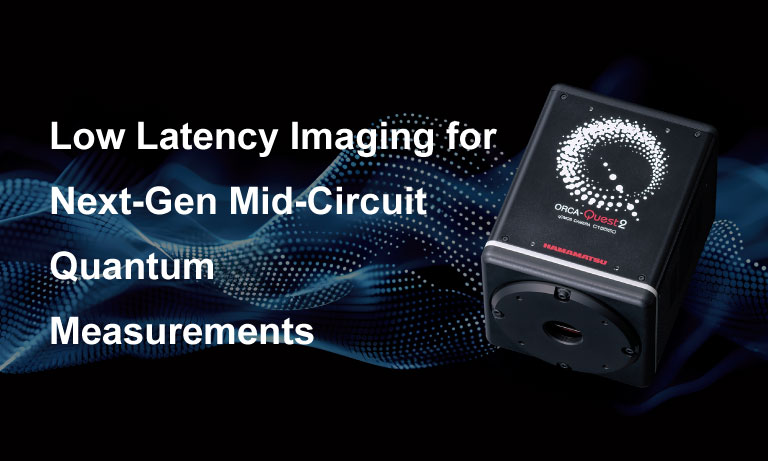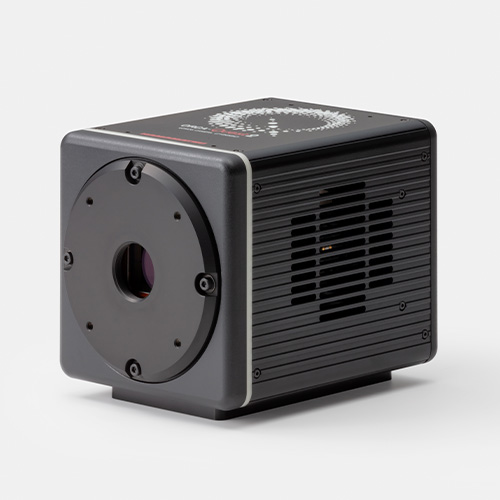Japan (JA)
国・地域を選択してください。
qCMOS®カメラ vs EM-CCDカメラ vol. 2 – 量子ビット状態検出
量子コンピューティングは、ポストムーア時代の新たな技術として、さまざまな産業に革新的なブレイクスルーをもたらすと期待されています。現在、世界中の研究機関で実用化とその先の産業化を見据えた開発が進められています。
量子コンピューターのハードウェアには複数の方式がありますが、実用化に向けた有力なアプローチのひとつが、単一の中性原子またはイオン(以下まとめて「原子」と表記)を用いた方式です。この方式では、原子の蛍光を観測することで量子ビットアレイのモニタリングや量子ビットの状態検出を行います。量子ビットの状態を正確に検出するためには、単一原子の蛍光の有無を高速かつ高精度に判定する必要があり、そのためには高性能な計測用カメラが不可欠です。カメラの性能は、量子コンピューターの性能に直結すると言っても過言ではありません。
従来、量子ビットの状態検出にはEM-CCDカメラが広く使用されてきましたが、近年では感度が大幅に向上したCMOSカメラが注目を集めています。当社は科学計測用カメラのリーディングカンパニーとして、CMOSカメラの特長である定量性・高速性・高解像度を維持しながら、EM-CCDに匹敵する感度を実現した「qCMOS®カメラ(ORCA®-Questシリーズ)」を開発しました。現在、国内外の量子研究機関への導入が進んでおり、量子コンピューティング分野における新たなスタンダードとして注目されています。(詳細は「qCMOS vs EM-CCD vol.01」をご参照ください)。
本記事では、量子コンピューターの開発において重要な「原子蛍光検出の忠実度」について、qCMOSカメラ、sCMOS Gen IIIカメラ(qCMOSの前世代)、EM-CCDカメラを用いた定量的なシミュレーション結果を比較し、qCMOSカメラの優位性を明らかにします。
原子蛍光検出の忠実度の求め方
原子蛍光検出の忠実度は、以下の3ステップに基づいて定量的に評価することができます。
(i) 画像シミュレーションによる光度積算値の取得
On/Offそれぞれの状態に対して100,000フレームの画像シミュレーションを生成します。各フレームにおいて、原子を囲む3×3ピクセルアレイ内の光度を積算し、光度積算値を算出します。
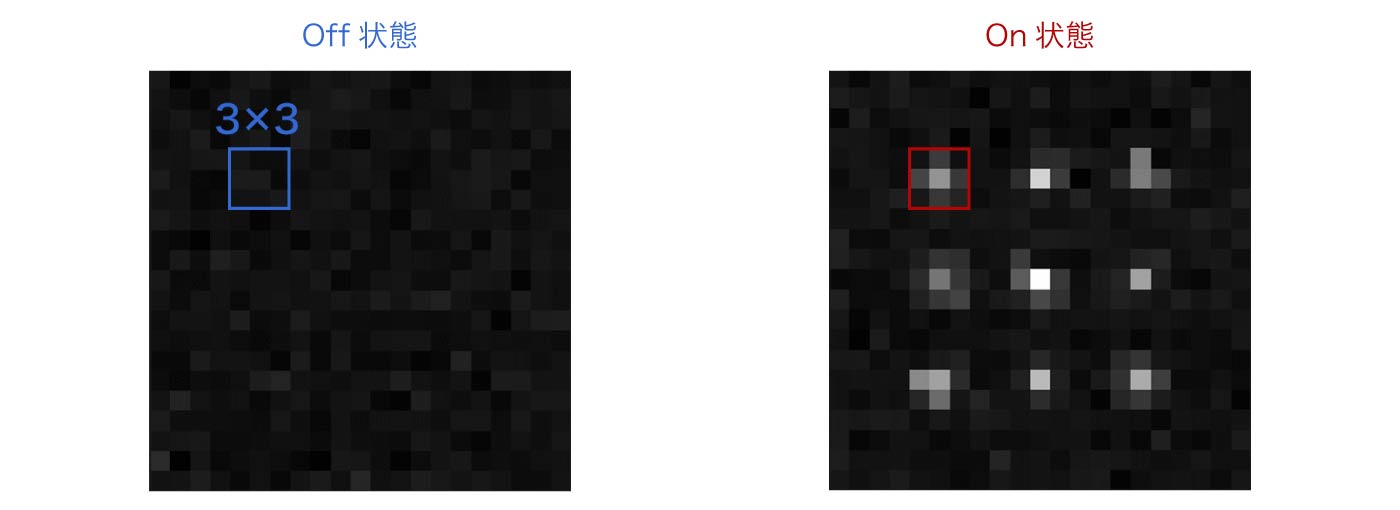
(ii) ヒストグラム解析による判定閾値の設定
On/Offそれぞれの状態に対して光度積算値の頻度ヒストグラムを作成します。両ヒストグラムが交差する位置を、On/Off状態を判定するための閾値として設定します。交差しない場合は、両分布の中間地点を閾値とします。
(iii) 忠実度指標の算出
設定した閾値に基づき、以下の指標を算出します。これらの指標により、各カメラ方式における原子蛍光検出の精度を定量的に比較することが可能です。
- True positive rate(真陽性率):On状態の積算値が閾値以上となっている割合
- エラー率:1-True positive rate/100
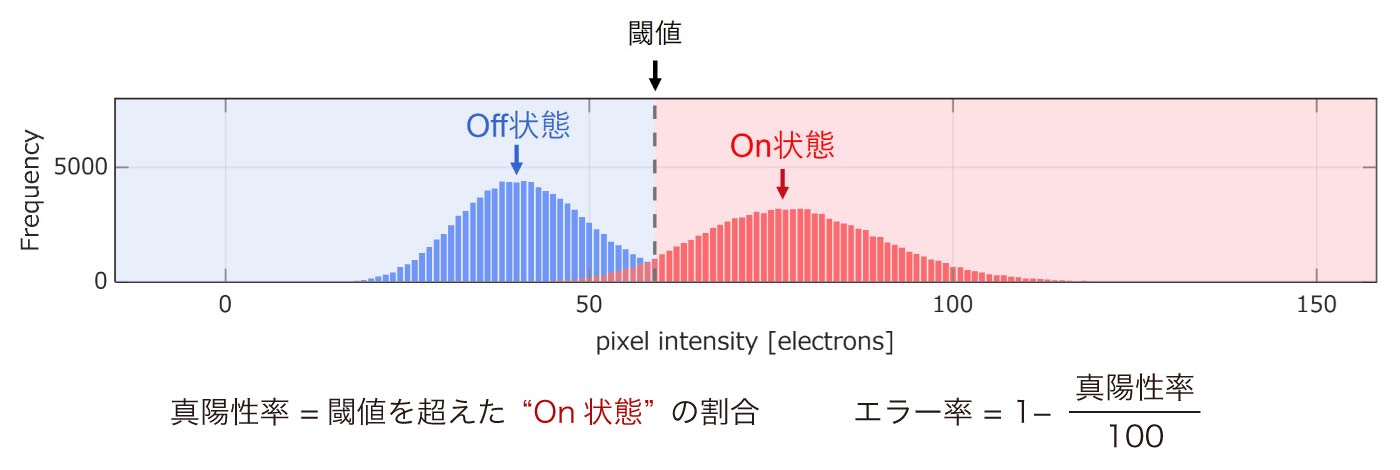
原子蛍光検出におけるシミュレーション条件
本シミュレーションでは、原子蛍光検出の忠実度を定量的に評価するために、以下の条件を設定し、各カメラ方式の性能を比較しました。
対象波長
- 493 nm (Ba+イオン)
- 780 nm (Rb原子)
光学条件
- スポットサイズ:回折限界σspot=1.22NA/λの広がりを持つ
- 対物レンズの開口数(NA): 0.8
- 対物レンズの倍率: “2σspot”=カメラのピクセルサイズと一致するよう設定
信号条件
- 原子信号: 104 photons/sec/atom
- バックグラウンド信号: 蛍光ピークの1/10(実際の実験環境に基づいたもの)
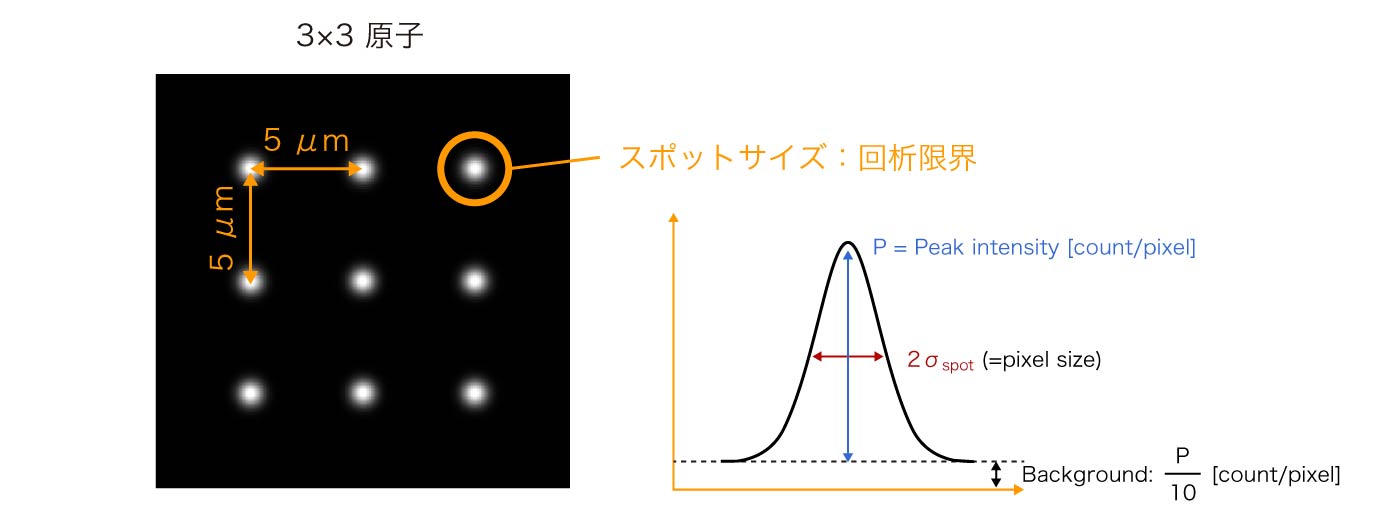
カメラの条件
本シミュレーションでは、原子蛍光検出の忠実度に影響を与える主要なカメラのパラメータに着目し、各方式の性能を比較しています。
特に本用途では高速撮像が求められるため、各カメラの最速のスキャンモード時のノイズの値を前提条件としています。
| 仕様 | ORCA-Quest 2 qCMOSカメラ |
ImagEM® X2-1K*1 EM-CCDカメラ |
ORCA-Fusion BT sCMOS Gen IIIカメラ |
|---|---|---|---|
| ピクセルサイズ (μm) | 4.6×4.6 | 13×13 | 6.5×6.5 |
| 量子効率 (493 nm / 780 nm) | 84 % / 49.1 % | 90 % / 73 % | 90 % / 63.3 % |
| 読み出しノイズ (e- rms) | 0.43 | < 1.0 (M =1200) | 1.6 |
| データレート (Megapixel/sec) | 1,130 | 10 | 470 |
*1浜松ホトニクス製EM-CCDカメラ。現在は製造および販売中止となっている。
CMOSカメラは、量子コンピューターに必要とされる高速なデータレート(=「ピクセル数」×「フレームレート」)に対応可能であり、実用性の高い選択肢です。
しかし、EM-CCDカメラと比較してどれだけ高い忠実度を示せるかが、本用途での採用可否を判断する上での重要なポイントとなります。中でも注目すべき感度パラメータが「量子効率」です。EM-CCDカメラは、特に近赤外領域(今回のシミュレーションでは780 nm)において、qCMOSカメラよりも相対的に高い量子効率を持つ場合が多く、検出性能に影響します。
シミュレーション結果および考察
原子蛍光検出の忠実度は、量子コンピューターの性能に大きな影響を与えます。たとえば、忠実度が「99 %か、99.9 %か」というわずかな違いであっても、システム全体の信頼性や演算精度に大きな差が生じます。
本シミュレーションでは、「99 %以上の忠実度(=1 %以下のエラー率)」を達成できるかそうかに焦点を当て、各カメラの性能を比較しています。
シミュレーション結果:波長493 nm (Ba+イオン)
シミュレーション画像
- 露光時間:10 ms
- 原子信号:100 photons/atom/frame
- バックグラウンド信号:4.7 photons/pixel/frame
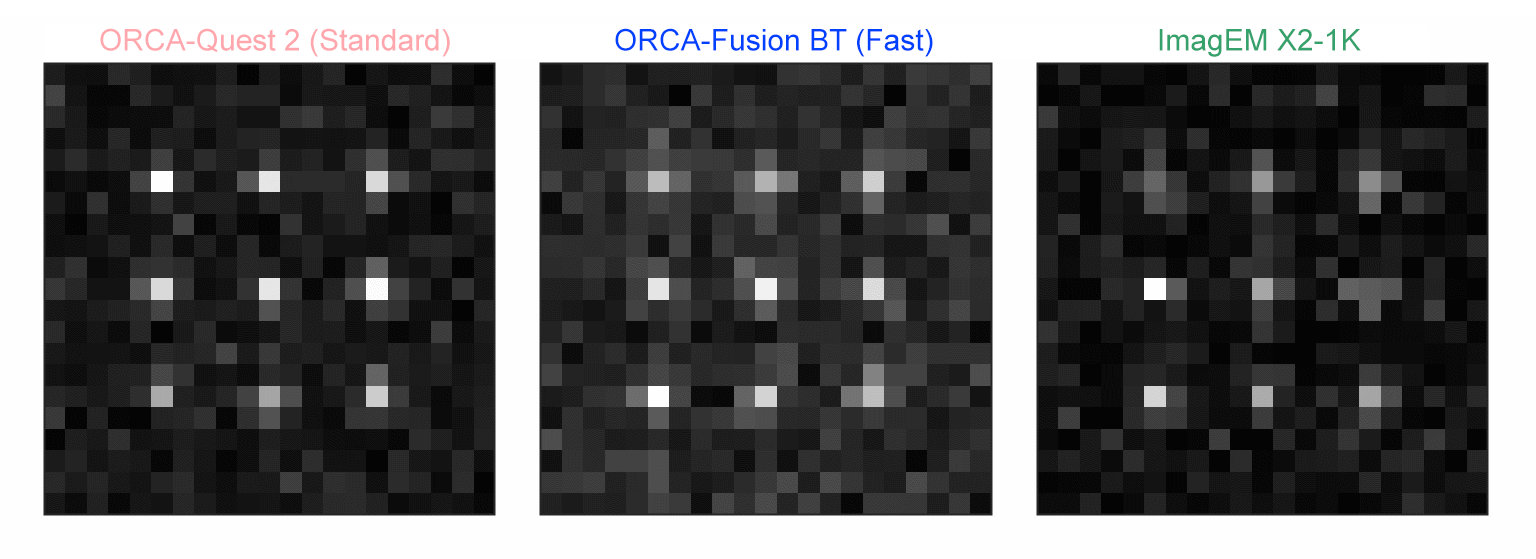
頻度ヒストグラムの比較
- 露光時間:10 ms
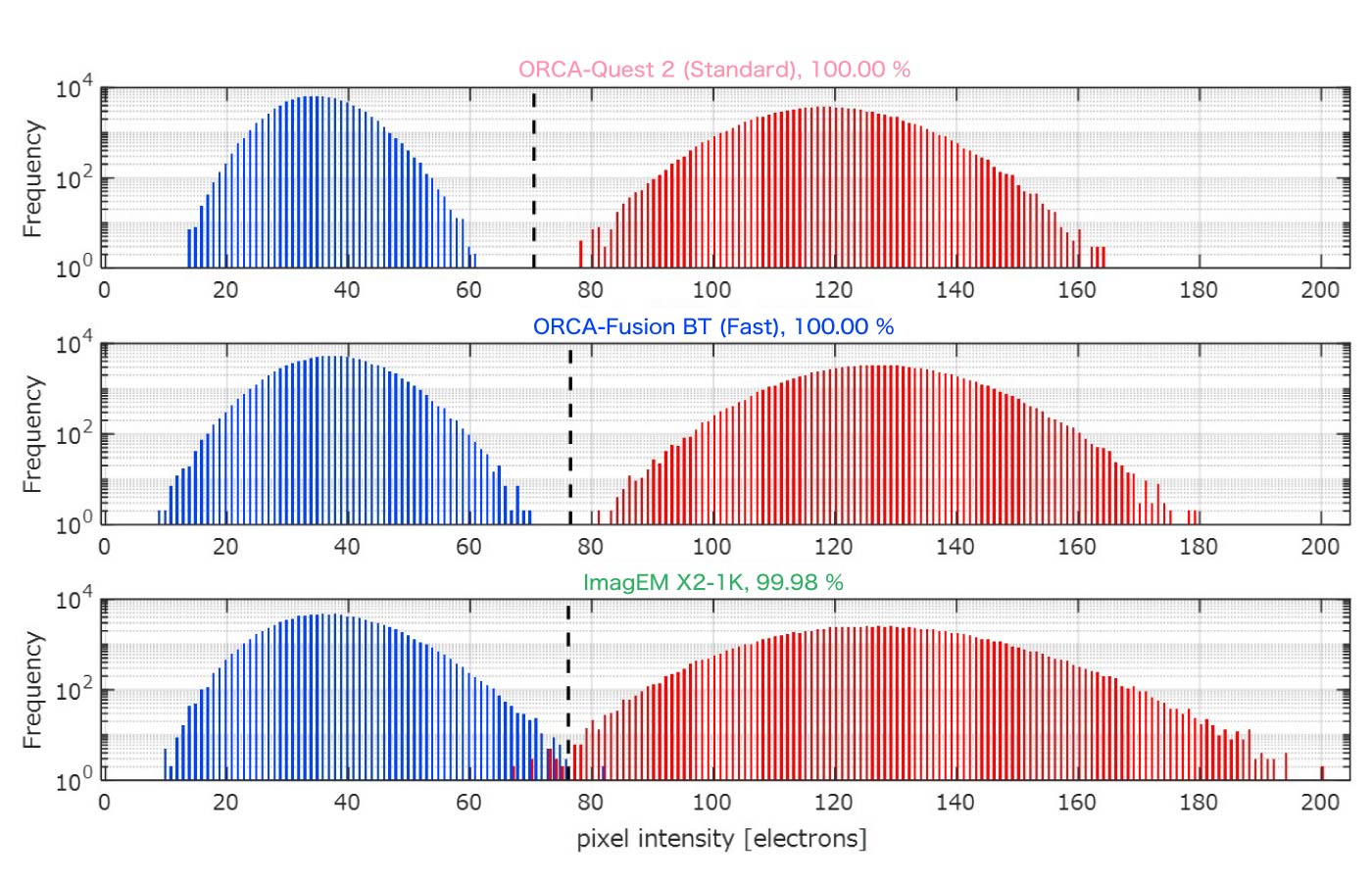
※EM-CCDカメラの出力はゲインによって増幅されるため、横軸の値はゲインで割ることで、実際に検出された光電子数として規格化しています。
- 露光時間:5 ms

- 露光時間:2 ms
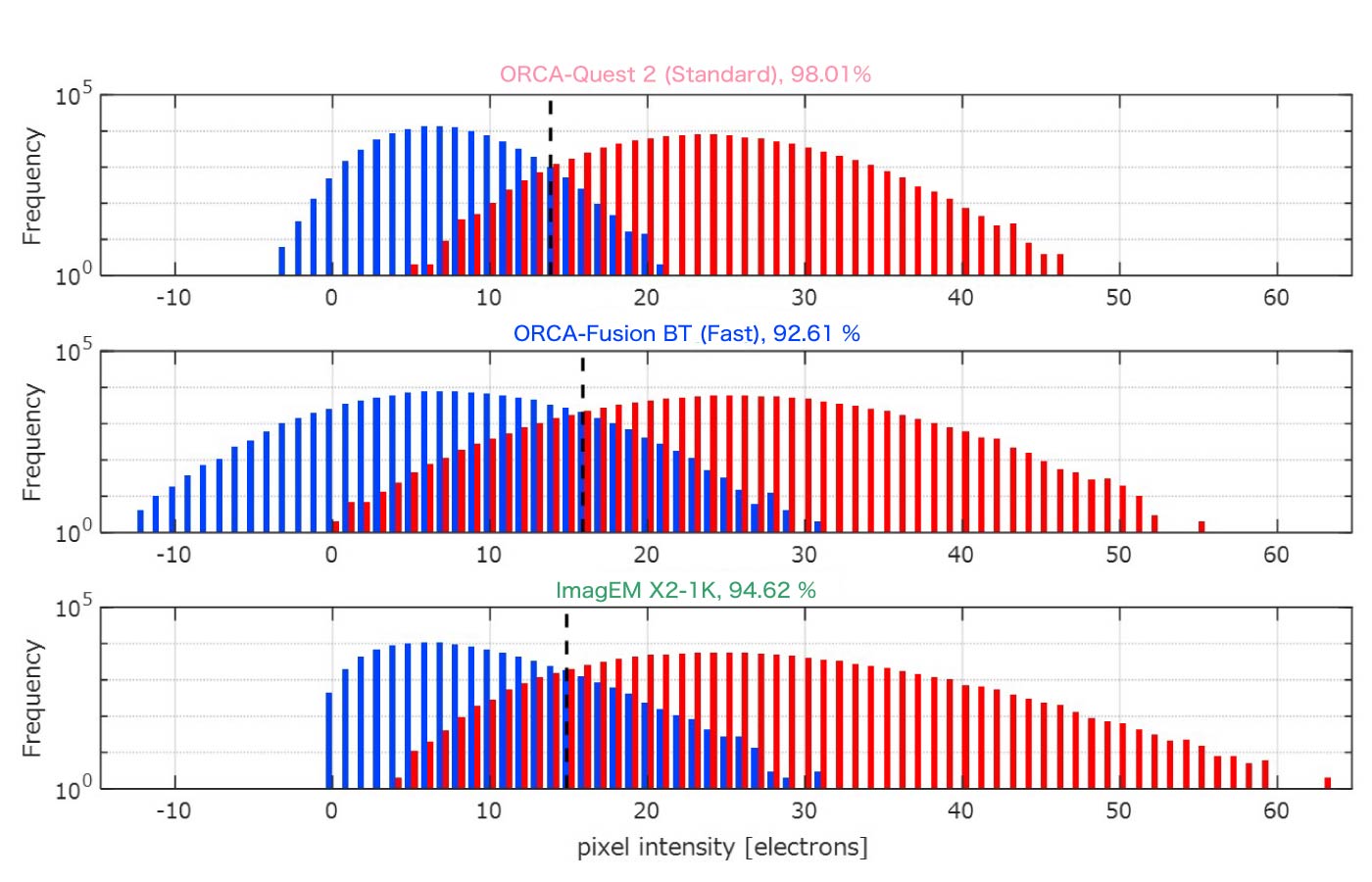
エラー率の比較
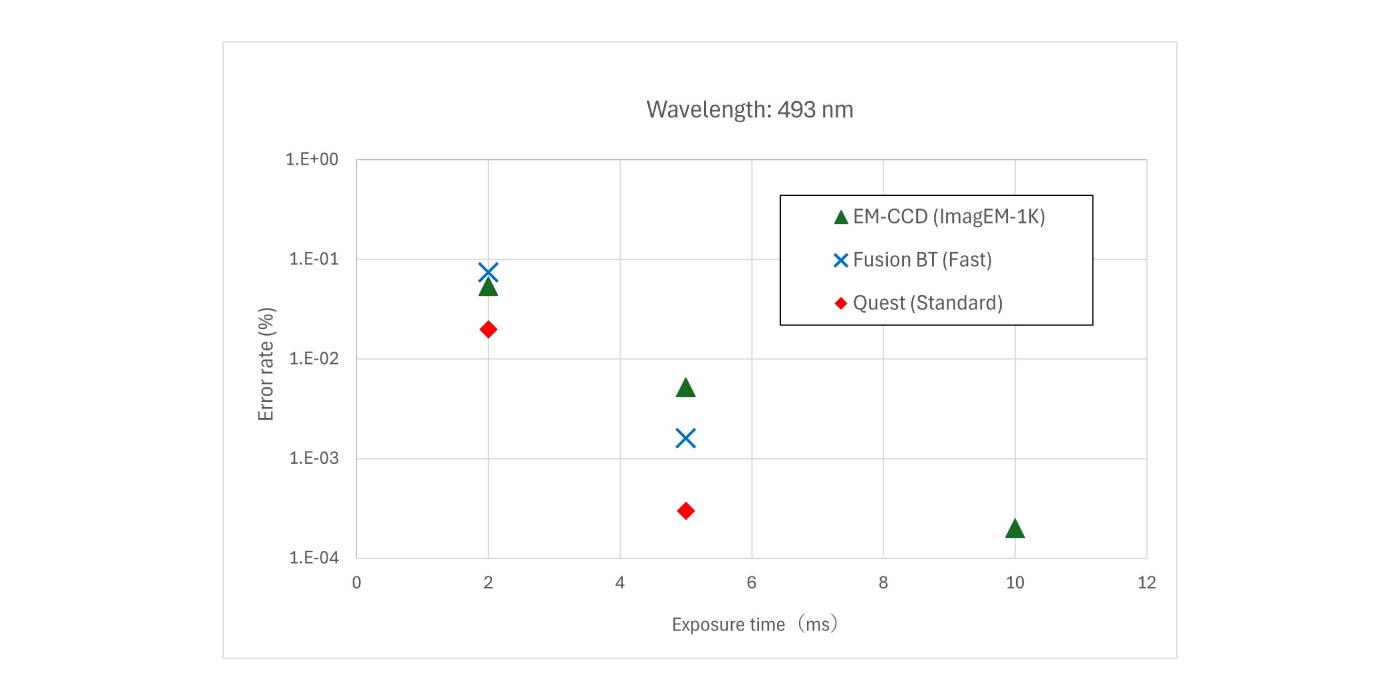
※露光時間10 msの条件下では、ORCA-Quest 2(Standard)および ORCA-Fusion BT(Fast)のエラー率が0%となるため、対数グラフ上ではプロットされません(対数スケールでは0が表示できないため)。
シミュレーション結果:波長780 nm (Rb原子)
シミュレーション画像
- 露光時間:10 ms
- 原子信号:100 photons/atom/frame
- バックグラウンド信号:4.7 photons/pixel/frame
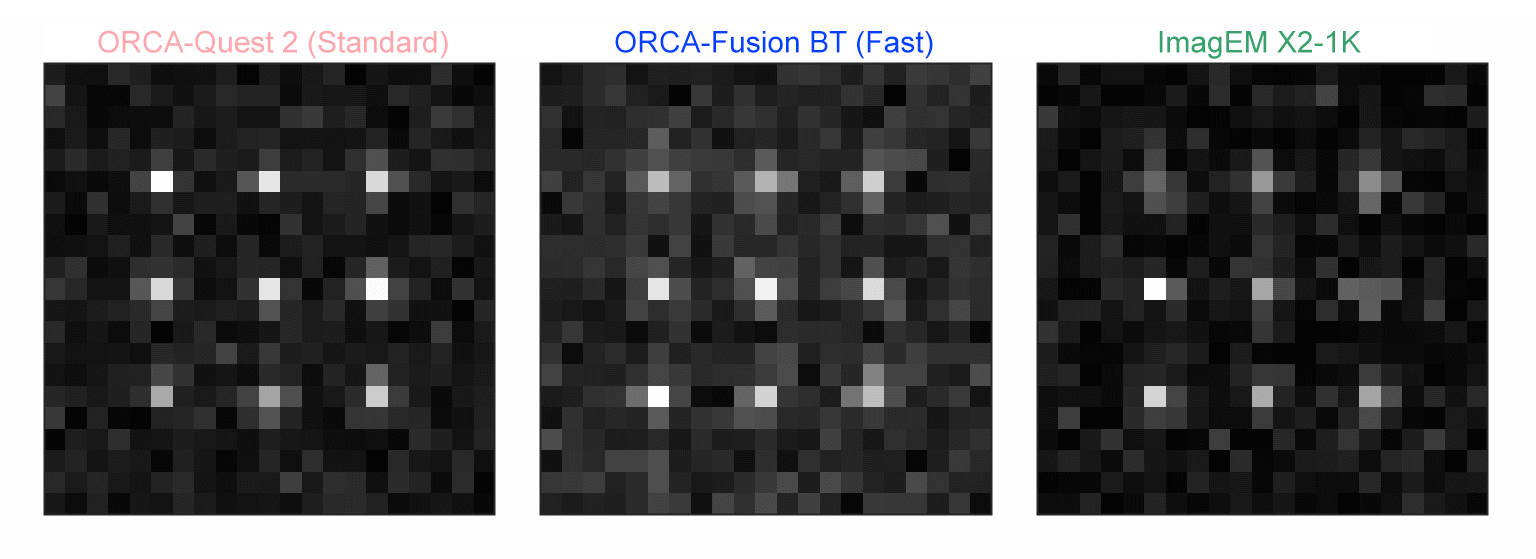
頻度ヒストグラムの比較
- 露光時間:10 ms
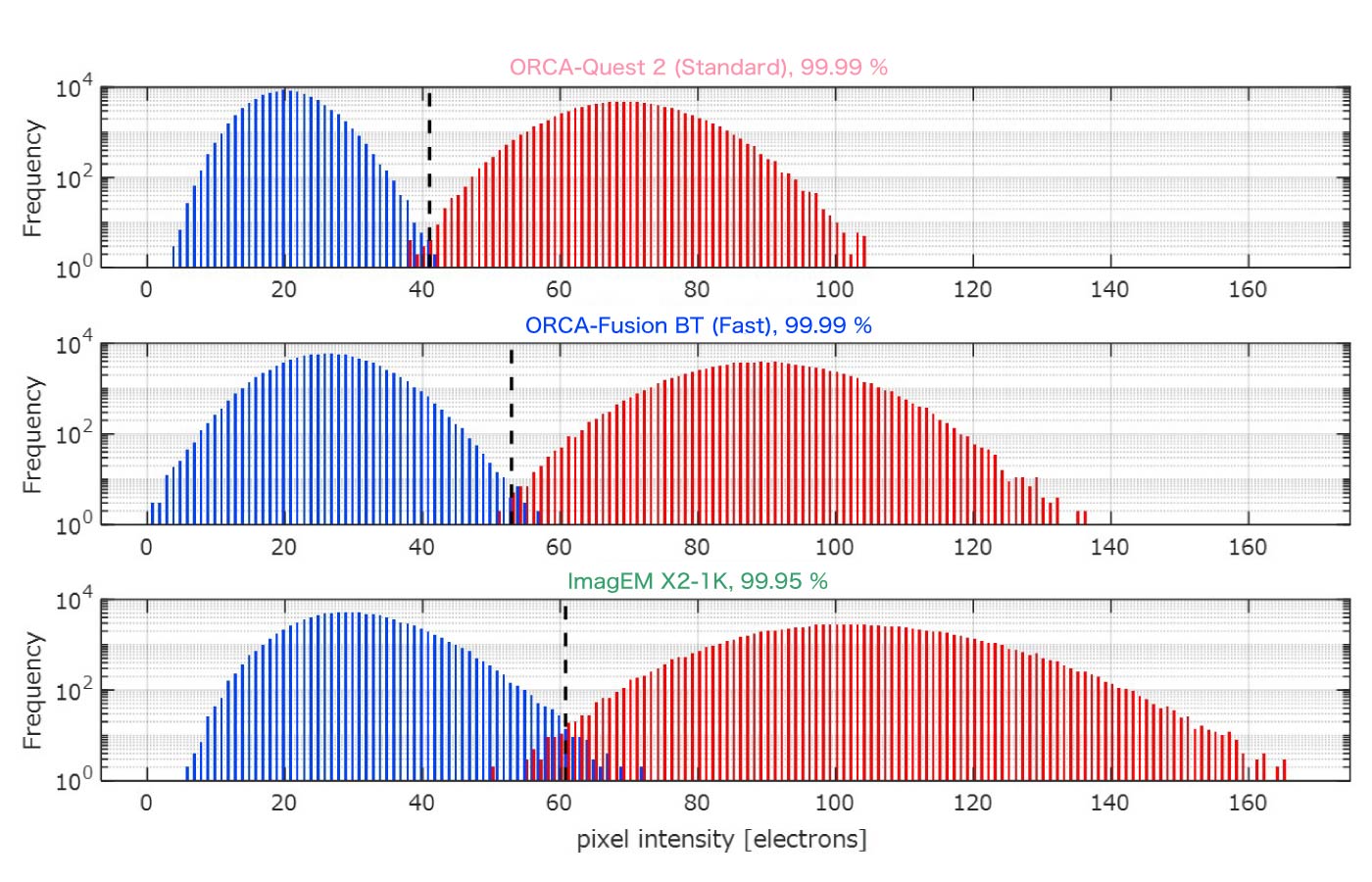
- 露光時間:5 ms
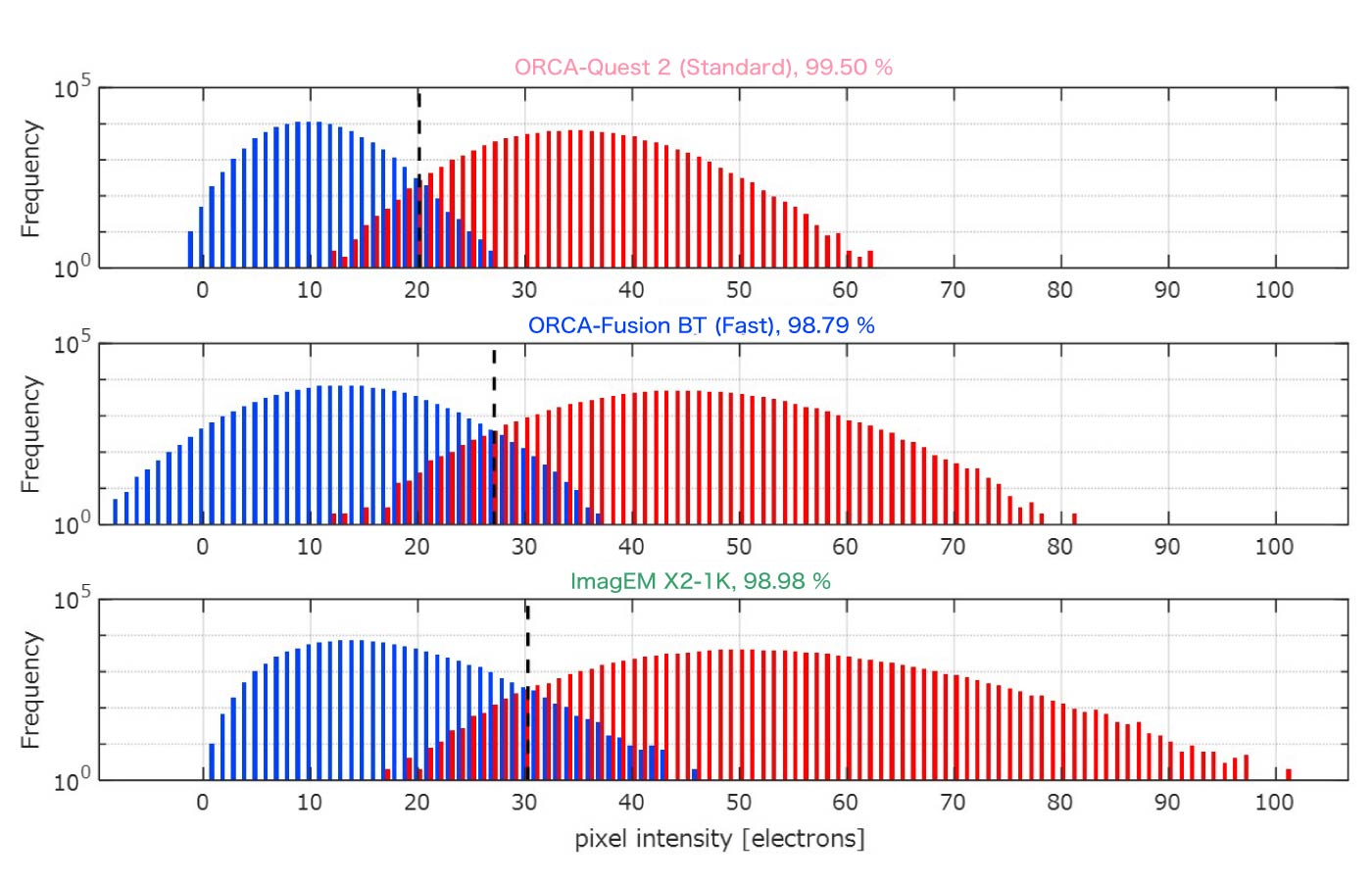
- 露光時間:2 ms

エラー率の比較
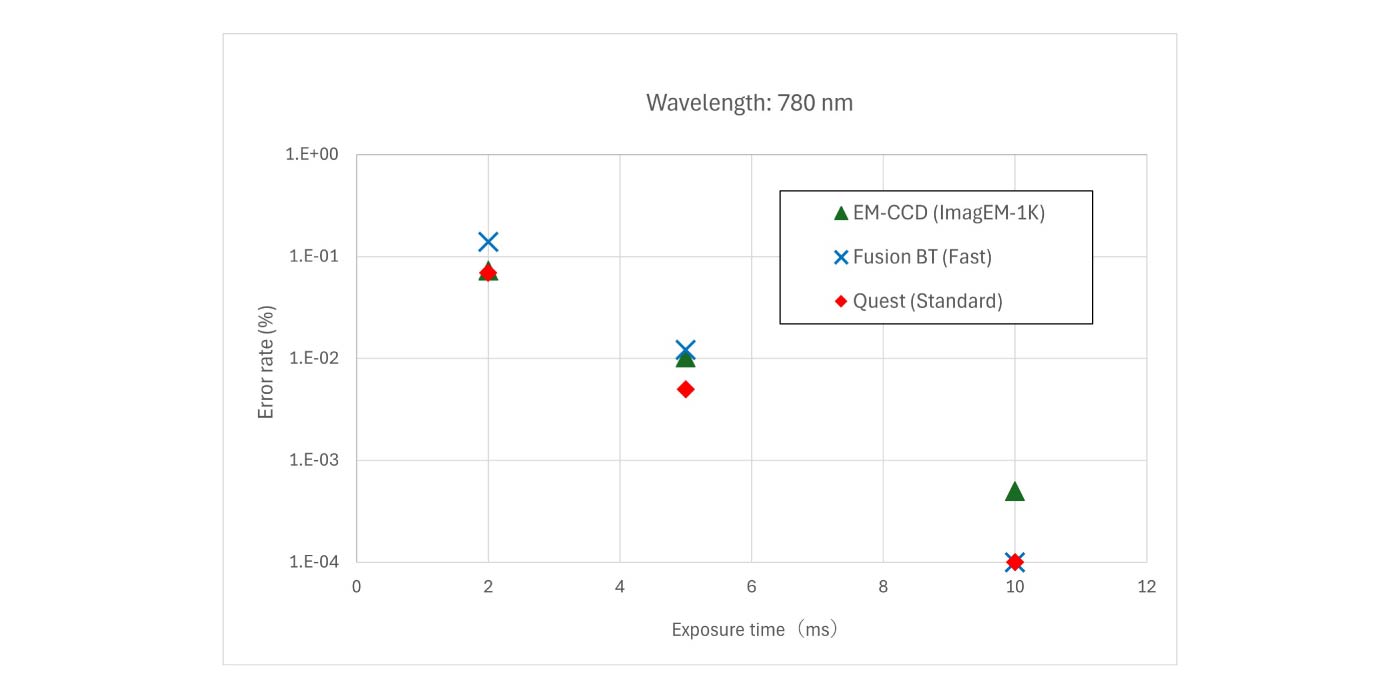
考察
本シミュレーションでは、qCMOSカメラがEM-CCDカメラと比較して、波長493 nmにおいて特に優れた忠実度(低エラー率)を示しました。さらに、相対的に量子効率が低くなる波長780 nmにおいても、qCMOSカメラはEM-CCDに対してやや優位な結果を示しました。
また興味深いことに、qCMOSカメラの前世代であるsCMOS Gen IIIカメラ(ORCA-Fusion BT)においても、エラー率1 %以下の領域ではEM-CCDカメラよりも高い忠実度を示す結果となりました。
この結果の背景には、EM-CCDカメラの特性が関係しています。EM-CCDは電子増倍機構により超高感度な光検出を可能にしていますが、増倍に伴う揺らぎ(ノイズ)が避けられず、定量的な計測精度に影響を与えます。量子ビットの状態検出では、高い忠実度を実現するために定量性が極めて重要であり、以下の図に示すように、EM-CCDではヒストグラムの分布が広がってしまう傾向があります。その結果、量子効率が相対的に低くても、qCMOSカメラの方がより高い忠実度を達成できるという、実用上重要な知見を得ることができました。
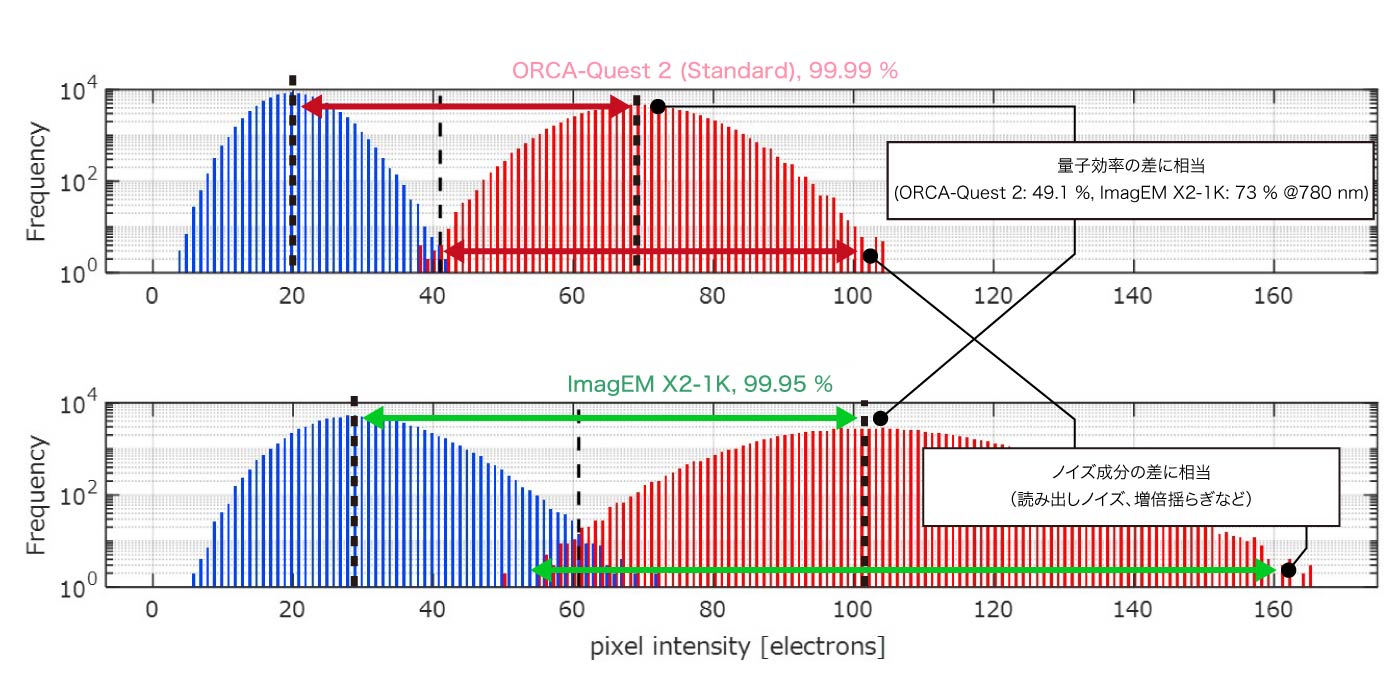
参考情報として、バックグラウンド信号が一切存在しない理想的な条件下でのシミュレーション結果も併せて掲載します。原子量子コンピューターでは、原子の操作や量子ビット状態検出にレーザが使用されるため、バックグラウンド信号を完全にゼロとするのは現実的ではありません。しかし、EM-CCDカメラはバックグラウンドの影響を受けやすい特性があるため、比較の一環としてこの条件での結果を提示します。
この理想条件下においても、波長493 nmではqCMOSカメラが引き続き優れた忠実度を示しました。一方で、波長780 nmではEM-CCDカメラが優位となる結果が得られました。
まとめ
本シミュレーションの結果、原子蛍光検出においてqCMOSカメラはEM-CCDカメラと比較して、ほとんどの条件下で優れた忠実度を示すことが明らかになりました。
近年のCMOS技術の進化により、qCMOSカメラは高感度・高速・高解像度を兼ね備えた次世代のイメージングデバイスとして注目されています。
この特性は、中性原子やイオンを用いた量子コンピューターの高速化・大規模化において、極めて重要な役割を果たすと考えられます。
qCMOSカメラは、量子技術のさらなる発展を支える中核的な計測ツールとして、今後ますますその価値を高めていくでしょう。
お客様導入事例
カメラトピックス
関連製品
- Confirmation
-
It looks like you're in the . If this is not your location, please select the correct region or country below.
You're headed to Hamamatsu Photonics website for JP (Japanese). If you want to view an other country's site, the optimized information will be provided by selecting options below.
In order to use this website comfortably, we use cookies. For cookie details please see our cookie policy.
- Cookie Policy
-
This website or its third-party tools use cookies, which are necessary to its functioning and required to achieve the purposes illustrated in this cookie policy. By closing the cookie warning banner, scrolling the page, clicking a link or continuing to browse otherwise, you agree to the use of cookies.
Hamamatsu uses cookies in order to enhance your experience on our website and ensure that our website functions.
You can visit this page at any time to learn more about cookies, get the most up to date information on how we use cookies and manage your cookie settings. We will not use cookies for any purpose other than the ones stated, but please note that we reserve the right to update our cookies.
1. What are cookies?
For modern websites to work according to visitor’s expectations, they need to collect certain basic information about visitors. To do this, a site will create small text files which are placed on visitor’s devices (computer or mobile) - these files are known as cookies when you access a website. Cookies are used in order to make websites function and work efficiently. Cookies are uniquely assigned to each visitor and can only be read by a web server in the domain that issued the cookie to the visitor. Cookies cannot be used to run programs or deliver viruses to a visitor’s device.
Cookies do various jobs which make the visitor’s experience of the internet much smoother and more interactive. For instance, cookies are used to remember the visitor’s preferences on sites they visit often, to remember language preference and to help navigate between pages more efficiently. Much, though not all, of the data collected is anonymous, though some of it is designed to detect browsing patterns and approximate geographical location to improve the visitor experience.
Certain type of cookies may require the data subject’s consent before storing them on the computer.
2. What are the different types of cookies?
This website uses two types of cookies:
- First party cookies. For our website, the first party cookies are controlled and maintained by Hamamatsu. No other parties have access to these cookies.
- Third party cookies. These cookies are implemented by organizations outside Hamamatsu. We do not have access to the data in these cookies, but we use these cookies to improve the overall website experience.
3. How do we use cookies?
This website uses cookies for following purposes:
- Certain cookies are necessary for our website to function. These are strictly necessary cookies and are required to enable website access, support navigation or provide relevant content. These cookies direct you to the correct region or country, and support security and ecommerce. Strictly necessary cookies also enforce your privacy preferences. Without these strictly necessary cookies, much of our website will not function.
- Analytics cookies are used to track website usage. This data enables us to improve our website usability, performance and website administration. In our analytics cookies, we do not store any personal identifying information.
- Functionality cookies. These are used to recognize you when you return to our website. This enables us to personalize our content for you, greet you by name and remember your preferences (for example, your choice of language or region).
- These cookies record your visit to our website, the pages you have visited and the links you have followed. We will use this information to make our website and the advertising displayed on it more relevant to your interests. We may also share this information with third parties for this purpose.
Cookies help us help you. Through the use of cookies, we learn what is important to our visitors and we develop and enhance website content and functionality to support your experience. Much of our website can be accessed if cookies are disabled, however certain website functions may not work. And, we believe your current and future visits will be enhanced if cookies are enabled.
4. Which cookies do we use?
There are two ways to manage cookie preferences.
- You can set your cookie preferences on your device or in your browser.
- You can set your cookie preferences at the website level.
If you don’t want to receive cookies, you can modify your browser so that it notifies you when cookies are sent to it or you can refuse cookies altogether. You can also delete cookies that have already been set.
If you wish to restrict or block web browser cookies which are set on your device then you can do this through your browser settings; the Help function within your browser should tell you how. Alternatively, you may wish to visit www.aboutcookies.org, which contains comprehensive information on how to do this on a wide variety of desktop browsers.
5. What are Internet tags and how do we use them with cookies?
Occasionally, we may use internet tags (also known as action tags, single-pixel GIFs, clear GIFs, invisible GIFs and 1-by-1 GIFs) at this site and may deploy these tags/cookies through a third-party advertising partner or a web analytical service partner which may be located and store the respective information (including your IP-address) in a foreign country. These tags/cookies are placed on both online advertisements that bring users to this site and on different pages of this site. We use this technology to measure the visitors' responses to our sites and the effectiveness of our advertising campaigns (including how many times a page is opened and which information is consulted) as well as to evaluate your use of this website. The third-party partner or the web analytical service partner may be able to collect data about visitors to our and other sites because of these internet tags/cookies, may compose reports regarding the website’s activity for us and may provide further services which are related to the use of the website and the internet. They may provide such information to other parties if there is a legal requirement that they do so, or if they hire the other parties to process information on their behalf.
If you would like more information about web tags and cookies associated with on-line advertising or to opt-out of third-party collection of this information, please visit the Network Advertising Initiative website http://www.networkadvertising.org.
6. Analytics and Advertisement Cookies
We use third-party cookies (such as Google Analytics) to track visitors on our website, to get reports about how visitors use the website and to inform, optimize and serve ads based on someone's past visits to our website.
You may opt-out of Google Analytics cookies by the websites provided by Google:
https://tools.google.com/dlpage/gaoptout?hl=en
As provided in this Privacy Policy (Article 5), you can learn more about opt-out cookies by the website provided by Network Advertising Initiative:
http://www.networkadvertising.org
We inform you that in such case you will not be able to wholly use all functions of our website.
Close
